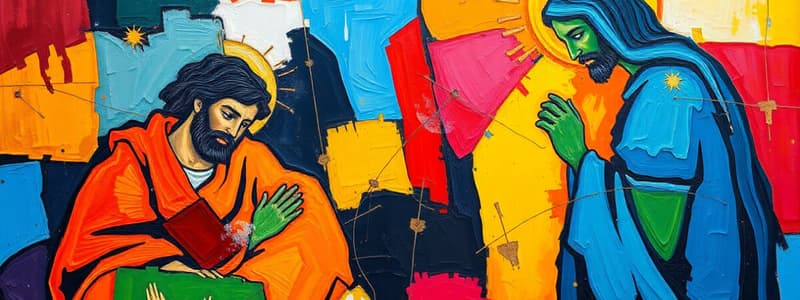Podcast
Questions and Answers
What is described as turning failures into opportunities according to the content?
What is described as turning failures into opportunities according to the content?
- God's intervention in timing (correct)
- Trust and hope in oneself
- Public recognition of effort
- Acknowledgment of one's mistakes
How does the content interpret the concept of 'failure'?
How does the content interpret the concept of 'failure'?
- As God's redirection (correct)
- As a permanent setback
- As a personal flaw
- As an illusion that can be avoided
What emotional state is suggested as a significant lie in the content?
What emotional state is suggested as a significant lie in the content?
- Despair (correct)
- Joyfulness
- Confidence
- Contentment
Which theme does the content emphasize regarding the crucifixion of Jesus?
Which theme does the content emphasize regarding the crucifixion of Jesus?
What does the phrase 'the sun will shine' imply in the context?
What does the phrase 'the sun will shine' imply in the context?
What illustrates the story of Jesus in the content?
What illustrates the story of Jesus in the content?
What mindset does the content encourage in the face of challenges?
What mindset does the content encourage in the face of challenges?
What does the term 'mockery' imply within the context of Jesus' experience?
What does the term 'mockery' imply within the context of Jesus' experience?
What promise is conveyed about the relationship between problems and outcomes?
What promise is conveyed about the relationship between problems and outcomes?
What does the phrase 'I prevail' signify in the context?
What does the phrase 'I prevail' signify in the context?
What role did the strategy of storytelling play in Jesus' teachings?
What role did the strategy of storytelling play in Jesus' teachings?
Which of the following statements best reflects Jesus' approach to injustice?
Which of the following statements best reflects Jesus' approach to injustice?
How did Jesus' calling relate to his personal experiences?
How did Jesus' calling relate to his personal experiences?
What does 'metanoia' refer to in the context of Jesus' teachings?
What does 'metanoia' refer to in the context of Jesus' teachings?
What was one of the key factors to Jesus' unstoppable nature in his mission?
What was one of the key factors to Jesus' unstoppable nature in his mission?
What is indicated by Jesus teaching accountability to the people?
What is indicated by Jesus teaching accountability to the people?
Which story exemplifies the principle of who constitutes a true neighbor according to Jesus?
Which story exemplifies the principle of who constitutes a true neighbor according to Jesus?
What was Jesus' attitude towards self-determination?
What was Jesus' attitude towards self-determination?
What inspired Jesus to shift from a life of carpentry to his mission?
What inspired Jesus to shift from a life of carpentry to his mission?
What does the phrase 'survival of the fittest' imply in the context of Jesus' critique?
What does the phrase 'survival of the fittest' imply in the context of Jesus' critique?
What was a significant consequence of Jesus's actions according to the content?
What was a significant consequence of Jesus's actions according to the content?
How did Jesus's teachings challenge societal norms during his time?
How did Jesus's teachings challenge societal norms during his time?
What did the narrative suggest about the followers of Jesus?
What did the narrative suggest about the followers of Jesus?
What was the implication of the statement 'Injustice boils down to economics'?
What was the implication of the statement 'Injustice boils down to economics'?
What role did betrayal play in the narrative concerning Jesus's death?
What role did betrayal play in the narrative concerning Jesus's death?
What does 'Jesus had a large followship' imply about his societal influence?
What does 'Jesus had a large followship' imply about his societal influence?
What does the phrase 'Jesus was very liberal and liberating' indicate?
What does the phrase 'Jesus was very liberal and liberating' indicate?
Which statement best describes the context of Jesus's death from a historical perspective?
Which statement best describes the context of Jesus's death from a historical perspective?
How did Jesus's approach to teaching differ from traditional methods?
How did Jesus's approach to teaching differ from traditional methods?
What does the term 'premature death' refer to in the context of Jesus's demise?
What does the term 'premature death' refer to in the context of Jesus's demise?
Flashcards
Injustice
Injustice
A state of being subjected to unfair or unjust treatment, often due to systemic issues or social structures.
Metanoia
Metanoia
The process of changing one's mindset, beliefs, and values. It involves a complete transformation of the heart and mind.
Courageous person
Courageous person
A person who is driven by a strong sense of duty and responsibility, taking action despite fear or hardship.
Challenging the order of things
Challenging the order of things
Signup and view all the flashcards
Analyzing a situation
Analyzing a situation
Signup and view all the flashcards
Parable
Parable
Signup and view all the flashcards
Awakening consciousness
Awakening consciousness
Signup and view all the flashcards
Education is key
Education is key
Signup and view all the flashcards
Church
Church
Signup and view all the flashcards
Making a commitment
Making a commitment
Signup and view all the flashcards
Jesus's Consciousness
Jesus's Consciousness
Signup and view all the flashcards
Jesus's Teaching Style
Jesus's Teaching Style
Signup and view all the flashcards
Jesus's Advocacy for the Marginalized
Jesus's Advocacy for the Marginalized
Signup and view all the flashcards
Jesus's Popularity
Jesus's Popularity
Signup and view all the flashcards
Jesus's Honesty
Jesus's Honesty
Signup and view all the flashcards
Jesus as a Threat
Jesus as a Threat
Signup and view all the flashcards
Jesus's Death as a Sacrifice
Jesus's Death as a Sacrifice
Signup and view all the flashcards
The Resurrection as a Promise
The Resurrection as a Promise
Signup and view all the flashcards
The Disciples' Reaction to Jesus's Death
The Disciples' Reaction to Jesus's Death
Signup and view all the flashcards
Jesus's Legacy
Jesus's Legacy
Signup and view all the flashcards
Turning Failures into Victories
Turning Failures into Victories
Signup and view all the flashcards
God's Perfect Timing
God's Perfect Timing
Signup and view all the flashcards
Failures as Opportunities
Failures as Opportunities
Signup and view all the flashcards
God's Redirection
God's Redirection
Signup and view all the flashcards
Crucifixion of Jesus
Crucifixion of Jesus
Signup and view all the flashcards
Mocking Jesus
Mocking Jesus
Signup and view all the flashcards
Crucifixion as Terror
Crucifixion as Terror
Signup and view all the flashcards
Resurrection and Victory
Resurrection and Victory
Signup and view all the flashcards
The Story of Hope
The Story of Hope
Signup and view all the flashcards
Continual Hope and Progress
Continual Hope and Progress
Signup and view all the flashcards
Study Notes
Jesus's Life and Teachings
- Jesus's life was not easy during the Roman Empire. There was no freedom of choice, and people were oppressed.
- The Bible contains reflections on God's unhappiness with injustice.
- Jesus's message was one of hope and justice.
- Jesus's teaching approach involved stories (parables), addressing indifference and injustice.
- The parable of the Good Samaritan illustrates the meaning of neighborliness.
- Jesus's teachings led to the creation of churches, fostering community among people of faith.
- Jesus challenged the existing order and awakened people's consciousness.
- His calling was not a sudden event, but something he had known all along.
- Jesus was a skilled carpenter and lived a good life.
- Jesus's strategy was analysis, then action (i.e., he understood the problem and then taught people to act by having the right mindset/perspective/consciousness).
- He focused on changing people's mindsets and perspectives rather than circumstances.
Jesus's Death and Legacy
- Jesus's death was not a natural death, but intended as a response to his threat to the established system.
- The religious leaders were threatened by the community Jesus formed. They saw Jesus as revolutionary and a potential threat.
- The response was violence and fear. -His followers were persecuted, killed or forced into other systems.
- His message and actions led to new forms of cooperation & community building.
- Jesus's death was a turning point. He died physically but his message of hope and community continues today.
- His followers' resilience and adaptability created new ways of living and working.
- Jesus's death was a painful experience but it spurred the development of churches and cooperation.
- Jesus' teachings highlight the importance of taking action, not waiting for a solution.
- Believing that others are human beings and entitled to rest and enjoyment.
- His actions and teachings challenged social norms & established beliefs, causing enemies to react in anger.
- He was a threat and met with opposition in many directions.
Key Concepts
- Metanoia (Revolution of the Heart): A complete change of heart and perspective, central to Jesus's teachings.
- Accountability: The acceptance of responsibility for one's actions and their impact on others.
- Marketability: Jesus possessed skills that were very valuable in his time, an essential quality for anyone who wants to make a change.
- Calling: A divine purpose or mission that drives someone to change his way/approach in a meaningful way.
Studying That Suits You
Use AI to generate personalized quizzes and flashcards to suit your learning preferences.




